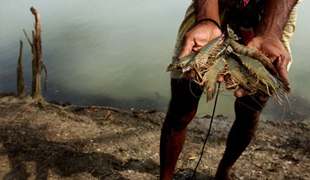Bangladesh tackles climate change by fusing rice paddies with fish farms
1 March 2013
Integrating coastal aquaculture with wet rice farming could boost Bangladesh's food security and combat climate change
NaimulHaq for SciDev part of the Guardian development network
guardian.co.uk
|
By combining aquaculture with wet paddy farming in its coastal areasBangladesh can meet food security and climate change issues, says a report.
The approach promises more nutritious food without causing environmental damage, and has the potential for a "blue-green revolution" on Bangladesh's existing crop areas, extending to about 10m hectares (25m acres) and an additional nearly 3m hectares that remain waterlogged for four to six months.
|

Expanding prawn farming could help Bangladesh's economic growth. Photograph: Martin Godwin for the Guardian
|
"The carrying capacities of these additional lands and waters, when fully utilised, can increase food production and economic growth," said Nesar Ahmed, author of the report published last month in Ocean & Coastal Management.
Ahmed, a researcher in fisheries management at the Bangladesh Agricultural University, Mymensingh, told SciDev.Net there was a "vital link between prawn and shrimp farming in coastal Bangladesh and a 'green economy' that addresses the current environmental and economic crisis".
EnamulHoq, senior scientist at the Bangladesh Fisheries Research Institute, agrees that the blue-green revolution "not only holds out huge economic benefits but also solves the growing climate change crisis".
"Aquaculture enhances soil fertility from fish waste discharge and contributes to pest control as several fish varieties feed on insects that harm crops," Hoq said.
Bangladesh's coastal aquaculture sector, which is dominated by export-oriented freshwater prawn and saline water shrimp farming, is already making a significant contribution to economic growth.
Ahmed's report shows that if prawn farming is expanded to 2.83m hectares of seasonally inundated crop land, Bangladesh would earn an additional $9.4bn (Ł6.3bn) annually. Similarly, if rice farming is also extended to the entire seasonally inundated crop fields, an additional 1.58m tonnes of rice could be produced annually.
According to NiamulNaser, professor of zoology at the University of Dhaka, freshwater shrimp cultivation in the Barind (north-western Bangladesh) has withstood extreme weather conditions in recent years.
Nazrul Islam, former director of information at the ministry of agriculture, told SciDev.Net: "Combining rice and fish farming is the answer to climate change problems, particularly in the coastal areas where saline water intrusion has been phenomenal."
Source:
http://www.guardian.co.uk/global-development/2013/mar/01/bangladesh-climate-change-rice-fish-farms

